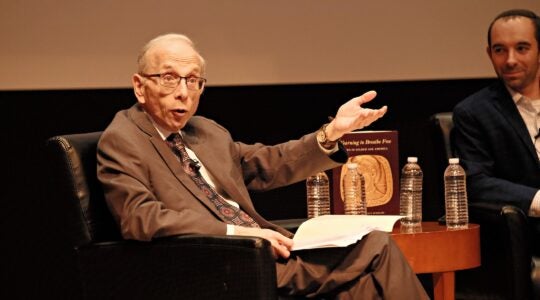Since negotiations between the Israelis and the Palestinians have stalled, it’s becoming fashionable to discuss an “easy fix” of unilaterally declaring a Palestinian state. But the “easy fix” attempts an end run around a negotiated settlement, which is the only route through which a settlement could possibly be reached.
A Palestinian Unilateral Declaration of Independence (UDI) would bypass peace talks entirely.
This isn’t just a theoretical discussion. The Palestinians are indicating they will declare a new state in September at the United Nations. Eleven nations in Latin America alone have endorsed the proposal.
Such a declaration would be a diplomatic disaster that would effectively and perhaps permanently end peace talks. Previous negotiations have narrowed key differences but now the Palestinians are walking away from every outstanding issue.
Annointing statehood on the Palestinians runs counter to every positively conceived plan to effectuate an agreement between the two sides.
Here’s how we got to this point. In 2009, Salam Fayyad, the Palestinian National Authority prime minister (who had pledged to build a governing infrastructure for the Palestinians) boasted that statehood would be achieved in 2011. Conventional wisdom at the time was that to do so he would commit to negotiations.
But in hindsight, Fayyad’s pronouncement was effectively an inertia excuse: why negotiate, why compromise, why even show up, when we are just going to declare a state and leave Israel on the sidelines? Such false hope—that the international community will take care of everything—allowed the Palestinians to walk away from negotiations.
Another clue about foot dragging: Palestinian National Authority President Mahmoud Abbas told the Washington Post’s Jackson Diehl in May 2009 that he was just going to wait things out.
Diehl wrote, “Instead, he says, he will remain passive.” Abbas told Diehl: "I will wait for Hamas to accept international commitments. I will wait for Israel to freeze settlements…Until then, in the West Bank, we have a good reality…the people are living a normal life."
The squandered negotiation opportunity cannot be underestimated: Israeli Prime Minister Benjamin Netanyahu continues to make offers for direct negotiations. Indeed, Netanyahu, in a major policy speech in June 2009, stated his clear commitment to a two-state solution—the objective of peacemakers and pundits since the Oslo Accords were signed in 1993.
Israel is not, and cannot be, tangential to the process. This is an imposed solution in the making.
According to a key agreement from the Oslo Accords, “Neither side shall initiate or take any step that will change the status of the West Bank and the Gaza Strip pending the outcome of the permanent status agreement.” But that’s exactly what UDI does.
So if many in the international community are frustrated over a lack of progress (read: Israel must do all the heavy lifting), why not just punt, and let the United Nations handle this?
Despite any proclamations of statehood, major issues would still need to be resolved, among them borders, security for Israel, refugees and water rights. Without direct talks, how will these and other issues be addressed? By a two-hour discussion and vote in the U.N. General Assembly? The UDI banishes Israel from the conversation altogether.
What about the U.N.’s supposed neutrality? The United Nations is a member of the Quartet (the international group working with Israel and the Palestinians toward a peace agreement). As such, you’d think it would at least make a feint toward some semblance of objectivity. But it doesn’t, and over a period of decades, the U.N.’s agencies have singled out Israel for all manner of harsh and unfair criticism. It is now going to allow, in its own house, a coronation of Palestinian statehood.
Without a negotiated settlement, how would the question of Hamas, a terrorist organization which calls for Israel’s destruction, and which has an iron grip on Gaza, be addressed? (The April 27 announcement that Fatah and Hamas have reconciled glaringly doesn’t begin to address this central point). A U.N.-recognized Palestinian state would not represent Gaza’s population, but might have a shared interest in its ultimate objectives in the region.
We urge the United States to veto a resolution should it come to the Security Council. We hope that the General Assembly—if it really and finally wishes to see the Israeli-Palestinian issue resolved—will recognize the folly of a resolution of expediency.
What is so vexing is that only lip service is being paid to negotiations by a good part of the international community. A unilateral declaration will not bring peace one day sooner. The hard bargaining and negotiations that constitute conflict resolution must proceed and will hopefully lead to a positive outcome.
Difficult problems are rarely solved easily. The international community must recognize that the seemingly simple solution of a unilateral declaration of a Palestinian state would be a mistake of incalculable dimensions.
Daniel S. Mariaschin is executive vice president of B’nai B’rith International
The New York Jewish Week brings you the stories behind the headlines, keeping you connected to Jewish life in New York. Help sustain the reporting you trust by donating today.




